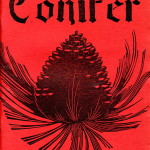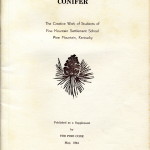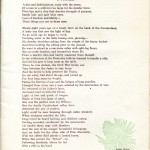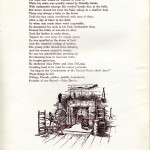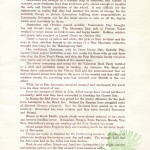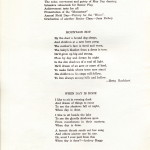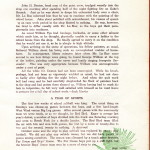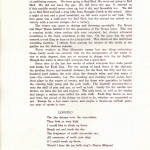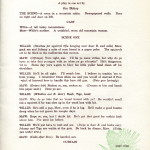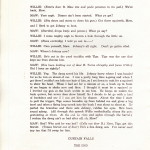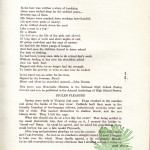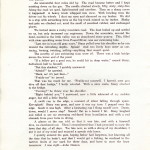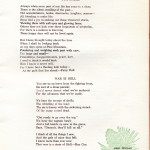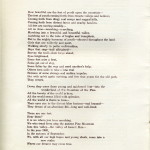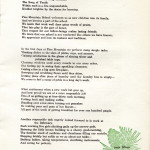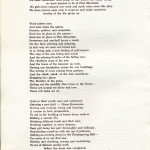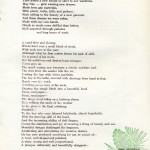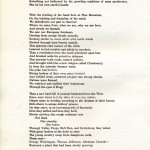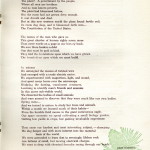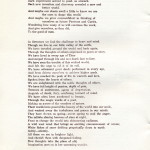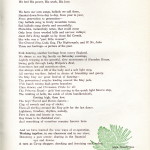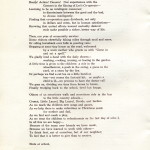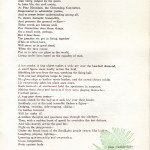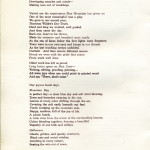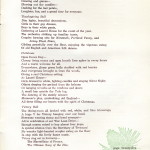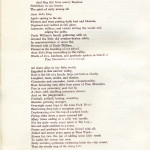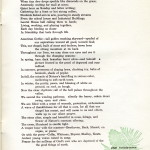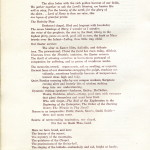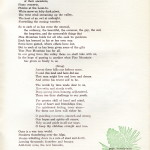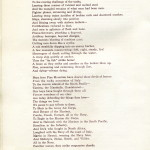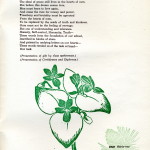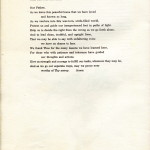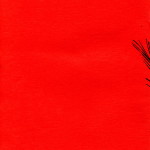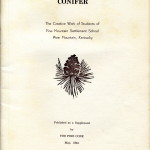Pine Mountain Settlement School
Series 17: PMSS PUBLICATIONS
Conifer 1944 May
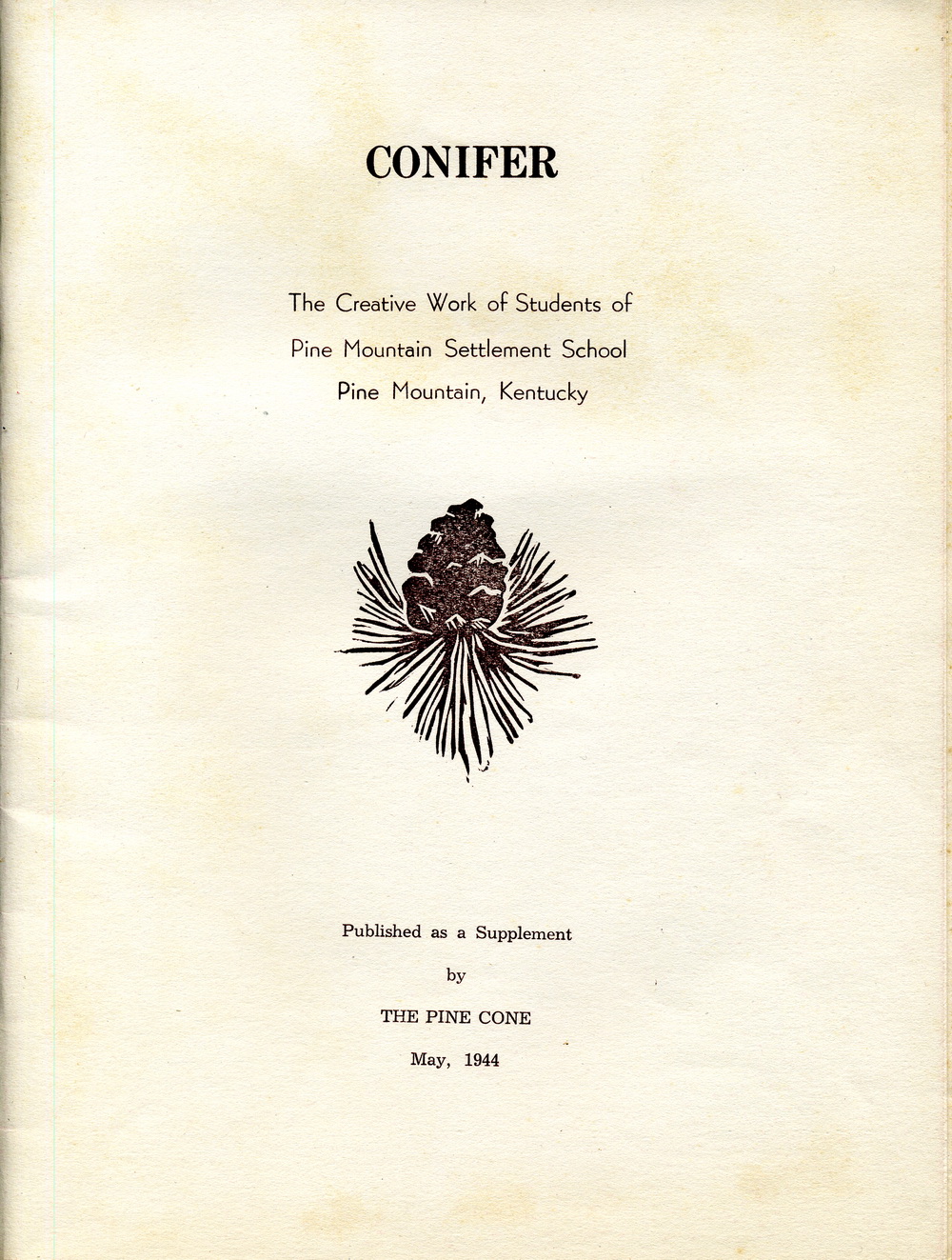
Conifer 1944 – Page 1. [conifer_1944_001.jpg]
CONIFER 1944
May Supplement
TAGS: Conifer, creative writing, Pine Mountain Settlement School students, PMSS student publications, PMSS student activities
CONTENTS: Conifer – 1944
Conifer ; creative writing ; settlement schools ; students ; The Pine Cone ; pioneers ; Civil War ; Sal Dixon Creech ; William Creech ; Katherine Pettit ; Ethel de Long ; John Beaten ; Co-op store ; Community Groupers ; Community Day ; Mountain Day ; Putney Tower ; Laurel House ; Thanksgiving Ball ; Christmas ; Open House Day ; Nativity Play ; New Year’s Party ; Valentine Book Party ; War Bond drives ; Stamp drives ; Victory Ball ; WWII ; May Day ; Senior Play ; Achievement tests ; Field Day ; Betty Burkhart ; Audrey Boggs ; John H. Deaton ; paint crews ; Mr. [Glenn] LaRue ; William Tye ; George William ; sports ; swimming pool ; Field Day ; Nancy Miniard ; Jim Bishop ; plays ; Patsy Hall ; Ray Cox ; Infirmary ; Home Economics ; woodworking ; history ; nature studies ; chemistry ; literature ; ballads ; dancing ; Sword Dancing ; Morris Dancing ; filming ; community service ; Citizenship Committee ; playgrounds ; Halloween ; orchestras ; minuet ; Mummer’s plays ; War Loan Drive ; patriotism ; Aunt Sal’s Day ; scout trips ; Line Fork Wood ; Big Log ; School House ; industrial buildings ; Laurel House ; chapel ; vesper hours ; Thanksgiving ; Easter ; soldiers ;
GALLERY: Conifer 1944, May Supplement
[conifer_1944_cover.jpg]
[conifer_1944_001.jpg] through [conifer_1944_033.jpg]
- Conifer 1944 – Cover
- Conifer 1944 – Page 1
- Conifer 1944 – Page 3
- Conifer 1944 – Page 4
- Conifer 1944 – Page 5
- Conifer 1944 – Page 6
- Conifer 1944 – Page 7
- Conifer 1944 – Page 8
- Conifer 1944 – Page 9
- Conifer 1944 – Page 10
- Conifer 1944 – Page 11
- Conifer 1944 – Page 12
- Conifer 1944 – Page 13
- Conifer 1944 – Page 14
- Conifer 1944 – Page 15
- Conifer 1944 – Page 16
- Conifer 1944 – Page 17
- Conifer 1944 – Page 18
- Conifer 1944 – Page 19
- Conifer 1944 – Page 20
- Conifer 1944 – Page 21
- Conifer 1944 – Page 22
- Conifer 1944 – Page 23
- Conifer 1944 – Page 24
- Conifer 1944 – Page 25
- Conifer 1944 – Page 26
- Conifer 1944 – Page 27
- Conifer 1944 – Page 28
- Conifer 1944 – Page 29
- Conifer 1944 – Page 30
- Conifer 1944 – Page 31
- Conifer 1944 – Page 32
- Conifer 1944 – Back Cover
Back To:
CONIFER INDEX
See Also:
PUBLICATIONS PMSS 1944 Conifer How Beautiful Are the Feet of Youth
Upon the Mountain
| Title | Conifer – 1944 |
| Alt. Title | Pine Mountain Settlement School Conifer, May 1944 Supplement |
| Creator | Pine Mountain Settlement School |
| Identifier | https://pinemountainsettlement.net/?page_id=9629 |
| Subject Keyword | Conifer ; creative writing ; settlement schools ; students ; Pine Mountain Settlement School ; supplements ; The Pine Cone ; pioneers ; Civil War ; Sal Dixon Creech ; William Creech ; Katherine Pettit ; Ethel de Long ; schools ; John Beaten ; Co-op store ; Community Groupers ; Community Day ; Mountain Day ; Putney Tower ; Laurel House ; Thanksgiving Ball ; Christmas ; Open House Day ; Nativity Play ; New Year’s Party ; Valentine Book Party ; War Bond drives ; Stamp drives ; Victory Ball ; jeeps ; WWII ; May Day ; Senior Play ; Achievement tests ; Field Day ; Betty Burkhart ; Audrey Boggs ; John H. Deaton ; paint crews ; Mr. LaRue ; William Tye ; George William ; softball ; football ; Field Day ; Nancy Miniard ; Jim Bishop ; plays ; Patsy Hall ; Ray Cox ; Infirsmary ; Home Economics ; woodworking ; history ; nature studies ; chemistry ; literature ; ballads ; dancing ; Sword Dancing ; Morris Dancing ; filming ; community service ; Citizenship Committee ; baseball ; playgrounds ; Halloween ; orchestras ; minuet ; Mummer’s plays ; War Loan Drive ; patriotism ; Aunt Sal’s Day ; swimming pool ; scout trips ; Line Fork Wood ; Big Log ; School House ; industrial buildings ; Laurel House ; chapel ; vesper hours ; Thanksgiving ; Easter ; soldiers ; Pine Mountain, KY ; Harlan County, KY ; |
| Subject LCSH | Conifer – 1944. Pine Mountain Settlement School (Pine Mountain, Ky.) — History. Harlan County (Ky.) — History. Education — Kentucky — Harlan County. Rural schools — Kentucky — History. Schools — Appalachian Region, Southern. |
| Description | The literary publication of the school during the boarding school year of 1944. Written by students and containing fiction, prose, and poetry. The first creative writing publication written and printed by the students at Pine Mountain Settlement School. First published in 1930 as the Pine Cone and later replaced by Conifer, the volumes in the early years duplicate one another, in part and issue numbers can be confusing, but the run of the periodical is largely well documented by volume and issue. |
| Publisher | Pine Mountain Settlement School Press |
| Contributor | Various |
| Rights | Any display, publication, or public use must credit the Pine Mountain Settlement School. Copyright retained by the creators of certain items in the collection, or their descendants, as stipulated by United States copyright law. |
| Date Original | 1944 |
| Type | Text ; photograph ; |
| Format | Small multipage booklet in a variety of sizes. |
| Source | Pine Mountain Settlement School archive ; Series 17: PMSS Publications (Published by the School) ; |
| Language | English |
| Relation | Pine Mountain Settlement School ; Series 17: PMSS Publications (Published by the School) ; Pine Mountain Settlement School, Pine Mountain, KY |
| Coverage Temporal | 1944 |
| Coverage Spatial | Pine Mountain, KY ; Harlan County, KY ; |
| Donor | Various |
| Acquisition | Archival |
| Citation | Pine Mountain Settlement School – Conifer. Pine Mountain Settlement School Archive. Pine Mountain, KY. |
| Processed By | Helen Hayes Wykle ; Ann Angel Eberhardt ; |
| Last Updated | 2012-06-25 hw ;2014-06-22aae
Source Pine Mountain Settlement School – Conifer. Pine Mountain Settlement School Archive. Pine Mountain, KY. Archival material. |
- Conifer 1944 – Cover
- Conifer 1944 – Page 1. [conifer_1944_001.jpg]
- Conifer 1944 – Page 4 [Detail]
Back to CONIFER INDEX
TRANSCRIPTION: Conifer 1944, May Supplement
Cover: CONIFER May, 1944
Page 1
CONIFER
The Creative Work of Students of
Pine Mountain Settlement School
Pine Mountain, Kentucky
Published as a Supplement
to
THE PINE CONE
May, 1944
Page 2
Page 3
A PIONEER
A dim and faded picture, rusty with the years,
Of a man in a uniform two large for his slender form.
Firm lips and a chin that denotes strength of purpose,
Sandy hair and pale blue eyes.
Love of freedom and liberty—
These things you see in those eyes.
Ninety-eight years ago on a lonely farm on the bank of the Cumberland,
A baby boy first saw the light of day.
At an early age he began to work,
Carrying water to the field, hoeing corn, plowing—
His slender shoulders aching from the weight of the heavy bucket
And from holding the jolting plow in the ground.
He went to school in a one-room cabin with split-log floors,
Sat on crude benches, and learned his three R’s
From a teacher who had barely mastered them himself.
In the wilderness of the Kentucky hills he learned to handle a rifle,
And did his part to keep meat on the table.
When he was sixteen, the Civil War broke out.
Torn between the desire to stay home
And the desire to help preserve the Union,
He ran away, lied about his age, and joined up.
For four long years he fought,
Facing the horrors of war and the fatigue of long marches.
Changed from a boy into a man, sobered by the destruction of war,
He returned to his father’s farm,
And paid court to little Sal Dixon.
Light of foot and quick of tongue,
Slight of form but large of spirit,
She was the perfect mate for William.
But the fertile Cumberland valley farm
Attracted the eye of settlers.
Light could be seen beaming through cabin windows
When darkness mantled the hills.
Dogs could be heard barking and children crying.
Feeling crowded, smothered, by the newcomers,
He loaded three nags with blankets
And the rest of his meager household belongings
And set forth for the other side of Pine Mountain,
With the oldest child astride a loaded horse,
While Sal carried the “littlest” one,
Following fearlessly where he led
With a rifle in his hand.
Page 4
Six hundred acres of untouched land!
For days and weeks he worked to clear it,
While his cabin was quickly raised by friendly hands.
With undaunted courage Sal worked beside him in the field,
But never moved far from the baby asleep in a shallow hole.
There was always a baby in the house
Until the tiny cabin overflowed with nine of them.
After a day of labor in the field,
Or when rain made other work impossible,
He sharpened his tools in his little blacksmith shop,
Tanned the hides of animals he shot,
Used the leather to make shoes,
Tapped his own trees for maple syrup.
He was appalled at the abuse of land,
And the wasteful cutting of timber;
The young folks turned from farming,
And the women ceased to weave.
He saw his grandchildren growing up
Not knowing how to read and write.
He fought ignorance.
He sheltered Miss Pettit and Miss DeLong,
Granting land to be used for school purposes
“As long as the Constitution of the United States shall stand.”
These things he did.
William Creech, soldier, patriot, benefactor,
Founder of our School.
— John Beaten
Page 5
REVIEW OF THE YEAR
September 6th brought in a bumper crop of freshmen, and wonder of wonders, more freshman boys than freshman girls, almost enough to equalize the male and female population of the school. It was difficult for the sophomores to realize that they had attained the status of Co-ops, for the erstwhile Co-ops to picture themselves fulfilling their responsibilities as Community Groupers and for the latest seniors to take on all the dignity which must inevitably be theirs.
September and October passed quickly. Community Day brought fun and friends from afar. The Mountain Day trek to Putney Tower resulted in weary bones, no broken ones, and happy hearts. Goblins, witches, and ghosts held conclave in Laurel House on October 31st.
Under a canopy of yellow and white, the girls at their loveliest and the boys at their stateliest danced to the strains of a Pine Mountain orchestra, brought into being for the Thanksgiving Ball.
Our traditional Christmas, with its Open House Day, Nativity Play, Laurel House supper festivities, a gay two weeks for those who go and those who stay, the New Year’s Party, and then the Pine Mountain family complete once again, and off on the stretch of the second term.
The clever costuming and acting for the Valentine Book Party testified to a wide and profitable range in reading. An intensive War Bond and Stamp drive culminated in the Victory Ball and the announcement that we had purchased almost four jeeps in the space of two months and that staff and students during the preceding year had invested over $10,000 in the war effort.
While life at Pine Mountain remained tranquil and unchanged, the world is in the deep turmoil of war. From the invasion of Sicily in July, Allied troops have moved northward constantly, until now they have succeeded in breaking the Gustav line. In Russia the Red Army was poised for the winter offensive, for the push from Leningrad to the Black Sea. Behind the Russian lines straggled mobs of dejected German prisoners. Now the Russians have passed on to Axis territory. Sevastopol has been retaken and they have invaded Roumania and Poland. Names of South Pacific islands which were almost unheard of two years ago, became headline news: Kwajalein, Ponape, Truk, Tarawa, Munda, Yap. Now, MacArthur’s troops are winding up the New Guinea campaign. Allied planes from Foggia in Italy are traveling north for intensive bombing of Roumania. Troops are ready in England for the forthcoming invasion. Hundreds of planes are bombing the invasion coast day and night. The strangle hold that the Axis once had on the Allies has been broken.
Back in our valley, March and April are distinguished for study, movies, and dancing parties, not the first of each I must hasten to add.
Page 6
May leaves us gasping with events crowding one upon another:
The color, movement and gaiety of May Day dancing.
Intensive rehearsals for Senior Play
Achievement tests for all
Presentation of the “Moonstone”
Annual Field Day —Victory for the “Blues”.
Graduation of another Senior Class.
— Jane Bishop
MOUNTAIN BOY
By the door a hound dog sleeps,
And children at a new born peep;
The mother’s face is tired and worn,
The baby’s blanket from a dress is torn.
He’ll grow up big and strong,
Plow by day and dream by night
In the dim shadows of a coal oil light.
He’ll dream of an acre or more of land,
To make fields where trees now stand.
His children in his steps will follow,
To live always among hills and hollow.
— Betty Burkhart
WHEN DAY IS DONE
I like to sit in evening dusk
And dream of things to come
To see the shadows fall at night,
When day is done.
I like to sit beside the lake
To see the ghostly shadows spun
From moonbeams in their mystery,
When day is done.
A hermit thrush sends out her song
And others answer one by one.
Oh, must I ever part from this
When day is done?
— Audrey Boggs
Page 7
DEATON’S DILEMMA
John H. Deaton, head man of the paint crew, trudged wearily into the shop one morning after spending half of the night fighting fire on Gabe’s Branch. Just as he was about to drape his exhausted body over a chair, Mr. [Glenn] LaRue informed him that he was to continue with the painting of the school house. John stood petrified with astonishment, his visions of spending an easy work period in the shop blasted to nothing. He was, however, too tired to differ vocally with Mr. LaRue; so the boys got their paraphernalia into readiness.
As usual William Tye had lumbago, backache, or some other ailment which made him, so he thought, physically unable to carry a ladder to the school house from the shop. He finally agreed to carry it on the condition that he would not use it, as he is allergic to high altitude.
Upon arriving on the scene of operations, his fellow painters, as usual, flattered William about his being such an accomplished wielder of horsehairs. In consequence, fifteen minutes later when Mr. LaRue came around to see how things were going, he found George William at the top of the ladder, painting under the eaves and lustily singing Incognito Serenader. This was very appropriate because William was unrecognizable under a coat of paint.
All the while Mr. Deaton had not been unoccupied. While his brush, perhaps, had not been as vigorously wielded as usual, he had not done so badly after fighting fire the night before. And when the quit work bell had rung and he had carefully shepherded his flock of painters back to the shop and had gotten them cleaned up, William having had to wash his hair in turpentine, he felt very well satisfied with himself as he went home to prepare for a full day of school work. — Jack Martin
A YEAR OF SPORTS
The first few weeks of school softball was king. The usual thing on Sundays was choose-up games between the boys, and a few hard-fought West Wind versus Big Log games. After several games with the community team we were ready, or so we thought, for Red Bird. Eager to avenge last year’s defeat, a number of boys climbed into the truck one Saturday morning and went to Beech Fork for a double header. The Red Bird team filled the air with hits and won both games, the first by a score of twenty-five to two and the second, twenty to nothing. A shut-out!
October came and the urge to play softball was replaced by one to play football. We did not play any outside teams, but we did have plenty games among ourselves. The season was climaxed by a touch game between Far House and Boys’ House. The Far House boys put up a stiff fight, but the heavier Boys’ House team won by a score of sixty to
Page 8
For days after the opening of the basketball season the air was full of conflicting rumors. We were going to Red Bird. We were not going to Red Bird. We did not have the gas. We did have the gas. It seemed as if this muddle would never clear up, but it did, and favorably too. We did go to Red Bird and had a long hike from Straight Creek to the school. After a night of rest and a good breakfast, we felt more equal to our task. The first game was a walk-over for Red Bird, but the second try netted us a victory with a narrow margin—but a victory.
The winter was spent in skating and throwing snowballs. Far House and Boys’ House battled it for the possession of Far House lawn. This was a running battle, when neither side ever retreated, but always advanced sometimes to the front, sometimes to the rear. On the same day the girls entered a mud fling de luxe on the playground. This dissolved into individual wrestling matches. I refrain from naming the winner of this battle of the gentler sex for obvious reasons.
Warm weather at Pine Mountain means but one thing—swimming. Some hardy souls can scarcely wait for the temperature of the water to rise to sixty degrees, they are so anxious to plunge into the icy depths. Though the water is often cold, everyone has a good time.
Some time in the last few weeks of school everyone lays aside pencil and books for Field Day. For the strong of back there is the shot-put, the javeline throw, and baseball distance; for the fleet, the fifty and the one hundred yard dashes, the mile relay, the obstacle relay, and that tester of men — the cross-country run. The standing and running broad jumps have their place in the course of events, and for those who specialize in height, the running high jump and the pole vault. The baseball accuracy-throw tests the skill of arm and eye, as well as luck. Lastly for the nimble and limber, we have the bar and trapeze. The girls have, as well as the dashes and jumps, a unique race called the mile walk. Field Day leaves us sore and tired, but proud of the things we tried to do, whether we succeeded or not. Except for a few more swims and maybe a choose-up softball game, our year of sports is over.
LONGING
The sky droops over the mountains,
They look so very high.
I would like to climb up there,
Reach out and touch the sky.
The fragrance of earth surrounds me,
All creatures of earth now sing;
If I could reach up there,
Would I hear the joy bells ring?
—Nancy Miniard
Page 9
A WOMAN CAN CHANGE HER MIND
A play in one act by Jim Bishop
THE SCENE — A room in a mountain cabin. Newspapered walls. Door on right and door on left.
CAST
Willie — A tall lanky mountaineer.
Maw — Willie’s mother. A wrinkled, worn old mountain woman.
SCENE ONE
WILLIE: (Reaches for squirrel rifle hanging over door R. and calls) Maw, pack me and Johnny a mite of corn bread in a paper poke. The squirrels ort to be thick in the mulberries this mornin.
MAW: (Offstage) Yore right, son. I’ll fix ye some vittles, but why do ye have to take that young’un with ye when ye go a-huntin? Hit’s dangerous, hit is. Some day yore a-goin to blow his little yaller head clean off his shoulders.
WILLIE: He’ll be all right. I’ll watch him. I believe in teachin ’em to hunt young. I remember times when me and you would of starved if Paw ‘adn’t of knowed how to handle this here old gun. (Pats gun lovingly)
MAW: (Enters left) Reckon so, son, reckon so. (Crosses to him and hands him paper sack.) Here ye are.
WILLIE: (Whistles out R. door) Heah, Tige, heah!
MAW: Why do ye take that no ‘count hound with ye? He couldn’t smell out a squirrel if he was shet up in the wood box with hit.
WILLIE: He’s still a pup, Maw, even if he is big. He’ll make a good huntin dawg when he out grows his rompin days.
MAW: Hope so, son, but I doubt hit. He’s got thet good fer nothin look about him. I’ve seed hit before.
WILLIE: We’ll jest have to wait and see. (Steps to door R. and looks out.) Johnny and Tige are waitin at the gate. Be back by dinner, Maw. (Exits, …under arm.)
MAW: (Calls after him.) Be keerful, son.
CURTAIN
Page 10
SCENE TWO
WILLIE: (Enters door R. Maw sits and peels potatoes in tin pail.) We’re back, Maw.
MAW: Yore rapit. Dinner ain’t been started. What ye get?
WILLIE: (Sits down and starts to clean his gun.) Got three squirrels, Maw, and I liked to got Johnny to boot.
MAW: (Startled, drops knife and potato.) What ye say?
WILLIE: I come mighty nigh to blowin a hole through the little un.
MAW: (Rises excitedly) I told ye not to——!
WILLIE: Cam yoreself, Maw. Johnny’s all right. Don’t go gettin riled.
MAW: Where’s Johnny now?
WILLIE: He’s out in the yard tumblin with Tige. Tige was the one that kept me from shootin him.
MAW: (Has been looking out of door R. Turns abruptly and faces Willie) Did I heer ye rightly?
WILLIE: Yep. The dawg saved his life. Johnny knew where I was headed for so he run on ahead of me. I was a purty long time a-going and when I got there I couldn’t see hide ner hair of him, so I set down to wait fer a squirrel to show his head. When I had set fer a minute er so, a bush up in front of me begun to shake now and then. I thought it must be a squirrel so I leveled my gun at the bush waitin to see him. He keeps on makin the bush quiver, but never does show hisself. So I decide to let go with a load of buckshot and see if I can get him by chance. About the time I start to pull the trigger, Tige comes boundin up from behind me and gives a big howl and takes a flying leap smack into the bush I was about to shoot at. He parted the branches and there sets Johnny, rubbin his eyes. He’s been sound asleep. (All through this speech Willie methodically cleans his gun, gestulating at times. At the end he rises and sights through the barrel.) I reckon the dawg ain’t so bad after all, eh, Maw?
MAW: Bad? Who said he was bad? (Calls out door R.) Here, Tige, get this biscuit. (Tosses biscuit out of door) He’s a fine dawg, son. I’ve never seed any ten that I’d swap fer him.
CURTAIN FALLS – THE END
Page 11
DESPAIR
In his face was written a story of hardship.
Lines were etched deep by the unkind years—
Seventy-one of them.
His fingers were cracked from working bare-handed;
His eyes were pools of misery,
As he walked slowly down the road
Like a man in a fog—
Or a dream.
His had been the life of the pick and shovel,
Of long days of work and short nights of rest,
Of grimy coal-dust and the roar of motors.
He had felt the bitter pangs of hunger,
And had seen his children forced to leave school
For lack of clothing.
He had been young once, able to do a hard day’s work
Without feeling it, but now his shoulders ached
And his back hurt.
Ragged and dirty, he no longer had the strength
To battle his poverty or even to care how he looked.
In his hand was an order for his time,
Signed by the foreman. Fired!
Bitter and silent he stumbled onward.
— John Deaton
This poem won Honorable Mention in the National High School Poetry Contest and is to be published in the Annual Anthology of High School Poetry.
STOLEN PLEASURE
Spring came early to Virginia that year. Frogs croaked in the marshes and along the banks of the lazy river. Catbirds built their nests in the friendly branches of low-hanging willows, industriously carrying straw and bits of cloth. Fish sunned themselves in shallow shoals, and the sun blazed down. Then I felt the urge.
What else should one do on a hot day but swim? That being settled in my usual democratic way, that of voting on it, I crossed the bridge to “sound out” Stacy. As usual he agreed, and we asked his grandfather if we could borrow his car, a late model Plymouth.
After long and persistent pleading we won his consent. Stacy could drive and I was learning. As soon as we reached a straight stretch of road, I begged to take over the wheel. Stacy finally agreed, a bit reluctantly though, for he still remembered the snowy afternoon that I skidded around a curve on
Page 12
two wheels. An uneventful four miles slid by. The road became better and I kept mashing down on the gas. The needle climbed slowly, fifty, sixty, sixty-five. Along the road we sped, light-hearted and carefree. Then on a sharp curve it happened! A heavy truck whipped into view. With howling tires the driver cut his wheels. I shut my eyes and slammed on my brakes. We slid to a stop with screeching tires as the big truck missed us by inches. Shaky and pale we climbed out, amid the smell of scorched rubber, and exchanged places.
We turned down a rocky mountain road. The dust boiled up and settled on us, but only increased our eagerness. Down the mountain, around the bend, nestled in the little valley was an abandoned stone quarry. This, filled with clear sparkling water from Pound River, was our swimming hole.
“Last one in is an old gray mare,” Stacy yelled over his shoulder as he ran toward the refreshing depths. Splash! And two lively boys enter as one, racing, turning, twisting, yelling—anything that wasn’t quiet.
The novelty of just swimming soon wore off. There was a high bridge across the lower end of the pond.
“If a fellow got a good run, he could hit in deep water,” mused Stacy, half-aloud, half to himself.
“Not this chicken,” I quickly answered.
“Afraid?” he queried.
“Heck, no! it’s just that—”
“Fraidy-cat” he jeered.
That was too much for me. “Fraidy-cat yourself. I haven’t seen you dive off that, bridge,” I hotly retorted. With a slow smile, Stacy climbed to the bridge.
“Coming?” he threw over his shoulder.
“Right behind you,” I answered, now a little ashamed of my sudden anger, but still a little fearful.
A swift run to the edge, a moment of silent falling through space. Ker-splash! Stacy was gone, and now it was my turn. I peeped over the edge. Gosh! it was high. After a hesitating run I flung myself over. Down, down, would I never stop? Smack! flat as a board I hit. Stacy laughed and rolled to see me emerging red-faced from humiliation and with a red stomach from poor form in diving.
A glance at the sun told us that it was late, and with a farewell dive, we clambered out. Then I remembered that I had promised to mow the lawn that day, of all days. Too late now, so with a shrug of my shoulders, I put it out of my mind and enjoyed a speedy ride home.
I quietly entered the gate, hoping father had forgotten, but knowing all the time that he hadn’t, and that I would get a licking, be confined to the narrow limits of our yard for three days, and have to mow the lawn tomorrow. I was right.
— John Deaton
Page 13
TWO PATHS
Always when some part of our life has come to a close,
There is the silent recalling of the past—
Old acquaintances, books, classmates, laughter, sorrow—
All blending to make life;
Some find a joy in seeking out these treasured stores,
Viewing them with soft eyes and glowing faces;
Others dare not look over these fragments of yesterday,
For there is a sadness in knowing
These happy days will not be lived again.
But I have thought today about the time
When I shall be looking back
At my days spent at Pine Mountain,
Pondering and weighing each part with care,
The large and small—
Friendships, disappointments, peace, love.
I used to think it would hurt;
Now I know it never will,
For I have had a fleeting look today—
At the path that lies ahead.
— Patsy Hall
WAR IS HELL
You see us on leave from the fighting front,
On sort of a dress parade;
You’d never dream what we’ve endured
For the advances that we’ve made.
We hear the scream of shells,
The whistling of the lead;
The air is heavy with the sickening stench
Of the many rotted dead.
“Get ready to go over the top,” We hear the captain bawl;
And a kid beside us new to the game,
Says, “Dammit, they’ll kill us all.”
I think of all the things I saw,
And the pals of mine that fell;
I know more than ever now
That war is a state of Hell.
— Ray Cox
Page 14
HOW BEAUTIFUL ARE THE FEET OF YOUTH UPON THE MOUNTAIN
How beautiful are the feet of youth upon the mountain—
The feet of youth coming forth from remote valleys and hollows,
Coming forth from dingy coal camps and rugged hills,
Coming forth from distant farms and nearby hamlets.
All feet are moving steadily—
All in time—marching—marching,
Marching into a beautiful and bountiful valley,
Marching not to the tune of bugles and trumpets,
But to the mighty harmony of youth —shouted throughout the land.
Girls that are willowly and quiet,
Walking slowly in paths well-trodden;
Boys that stop— half affrighted—
Survey the trail —then forge ahead,
Eyes brightened.
Some feet miss a beat,
Some get out of step,
Some falter by the way and need another’s help;
Others turn aside to take a lone trail
Because of some strange and sudden impulse,
But with spirit again uprising, and feet that yearn for the old path,
They return.
Down they come those young and quickened feet —into the
wonderland of the Mountain of the Pine.
All the beauty of the world is here,
All the world seems filled with splendor,
All the world is theirs to love—
Their eyes rise to the distant blue horizon– and beyond—
They dream of an abundant life —long and well-lived.
Those are our feet.
Hear them?
It is we whom you hear marching.
We who tread from atop the ancient Pine Mountain
Into this valley— the valley of Isaac’s Run—
In the year 1940,
In the autumn of September.
We, with all our high hopes and young ideals, come into a new realm
Where our dreams may come true.
Page 15
Within each is the song familiar,
The Song of Youth.
Within each is a fire unquenchable,
Kindled brighter by the desire for learning.
Pine Mountain School welcomes us as new children into its family,
And we become a part of the school.
We learn that work well done gains words of praise,
That fair play is the part of honor,
That respect for our fellow-beings makes lasting friends.
We learn that our school is not conducted like others we have known;
We appreciate and love its customs and traditions.
In the first days at Pine Mountain we perform many simple tasks:
Washing dishes to the slam of plates, cups, and saucers,
Gaining satisfaction in the gleam of shining silver and polished table tops;
Cleaning windows until every muscle in our arms aches,
But feeling joy in seeing their sparkling cleanness;
Laying a fire in a big open fire-place,
Sweeping and scrubbing floors until they shine,
Ironing piece after piece of laundry until the laundry box is empty—
We come to feel a surge of pride in a long day’s work.
What excitement when a new work list goes up,
And how proud we are at a more responsible job!
Two of us getting up at four-thirty each morning,
Cutting fruit and making coffee,
Standing over a hot stove turning out pancakes
Or making pans and pans of hot biscuit—
All part of the work of getting breakfast for over one hundred people.
Another responsible task eagerly looked forward to is work at the Infirmary.
Each morning five girls climbing gaily up the narrow path,
Entering the little brown building to a cheery good-morning,
The familiar smell of medicine and cleanliness filling our nostrils;
Stepping briskly but softly as we go about our tasks—
Bathing babies, taking temperatures, sterilizing instruments,
And caring for patients.
Page 16
We shall remember with pride in our hearts the many things we have learned to do at Pine Mountain.
We girls have enjoyed our work and made tasks seem like play.
We have striven each year to improve and make ourselves worthy of the life given us.
Work makes men
And men make the nation.
Farmer, printer, and carpenter,
Each has its place in the nation—
Each has its place at Pine Mountain.
Seventeen and one-half hours a week,
On the farm plowing and planting;
In this way we earn our bread and
In so doing, gain a new feeling of self-respect.
The ring of the axe biting into wood;
And the echoing thunder of the falling tree;
The rhythmic song of the saw
And the boom of the hammer on rock,
Hewing out foundation stones for our buildings;
The lowing of cows coming from pasture,
And the clank, clank, of the iron stanchions
Snapping into place;
The thunder of the press,
Rolling out the monthly Pine Cone or the Notes—
These are sounds we know and love,
These tell tasks we do.
Girls in their youth, new and unlearned,
Entering a new field — Home Economics.
Sewing and cooking, living and learning.
A course in food preparation,
To aid in the building of future home makers.
Making a receipt [sic] file,
Studying different foods and their uses,
Working together to serve dinners,
Each girl doing her part thoroughly and willingly,
Acquainting ourselves with the use of patterns,
Making an evening dress for the Thanksgiving Ball —
For some of us our first one.
Basting and checking, sewing and rechecking,
Hours of delicate needle work
before the dress was completed,
Page 17
A dress we were proud to own, and proud to wear.
Time added a new blouse or skirt to our wardrobe.
May Day— girls wearing new dresses
Made from gay materials,
With pleats, tucks, frills and gathers,
Each adding to the beauty of a new garment.
And these dresses we wear today,
Made with our own hands,
Hands so much more skillful than before,
Skill acquired through patience
and long hours of work.
A hand slow and clumsy,
Works hard over a small block of wood,
With tools new to the user.
Although what he first makes shows his lack of skill,
He is proud of his work,
But his ambitions and desires burn stronger.
Times goes on.
The small coping saw becomes a steady machine tool.
The dust from the sander fills the air,
Coating the lips with bitter particles.
The boy at the lathe, covered with shavings from head to foot,
Bends over his work,
Watching every turn of his tools,
Shaping the rough block into a beautiful bowl.
Paint, sandpaper—
Paint, sandpaper—
The dingy wood takes on a lustrous sheen,
That reflects the smile of the worker
And, he gives it the final polishing.
Finished—
To the boy who once labored helplessly, almost hopelessly,
With the growing skill of the hand,
And the increasing ability of deft fingers,
Comes the satisfaction and joy of creating a thing of beauty and use.
Beautiful designs challenged the beginner,
Awakening and stimulating his creative desires.
He has now produced something he can be proud of—
A bowl, well shaped and polished,
A chair, strong and well proportioned,
A placque [sic], intricately and beautifully designed—
Page 18
A thing of beauty—
Something not fashioned by the growling machines of mass production,
But by his own careful hands.
With the training of the hand here at Pine Mountain,
Go the training and discipline of the mind.
We delved into our past to discover
Where we came from, what we are, why we are here,
And slowly we learned.
We saw our European forebears
Develop from savage blonde nomads,
Seeking shelter in caves while wild north winds
Howled through bare forests outside.
This sparsely-clad roamer of the wilds
Learned to find comfort and safety in numbers.
Then a civilization from the south advanced upon him
And brushed aside his primitive defenses.
This intruder built roads, trained soldiers,
And brought with him a new religion called Christianity.
In time the intruder became weak;
His yoke was broken.
Strong leaders of their own came forward
And welded weak, scattered peoples into strong wholes.
Nations were formed.
We watched and studied their beginnings
Through the eyes of Rugg.
Then a new land full of promise beckoned from the West.
Some were lured to it by tales of immense riches;
Others came to worship according to the dictates of their hearts;
Still others, to escape debtors’ prisons.
On they came, in an increasing tide of humanity.
Here they settled and here they built,
Slowly molding this rough continent into
Our land,
Our country,
Our home.
Through Valley Forge, Bull Run, and Gettysburg they toiled,
With great leaders at the helm to steer
The young country away from dangerous reefs,
These men —George Washington, Thomas Jefferson, Abraham Lincoln—
Nurtured a plant that had been slowly growing
Page 19
For hundreds of years.
The plant? A government by the people,
Where all men are brothers
And no man knows poverty.
The plant had blossomed before,
But the roots had not grown deep enough.
It met drou[ght] and died.
But in this new western world the plant found fertile soil,
Its roots dug deep, and it blossomed forth into—
The Constitution of the United States.
The names of the men who gave us
This great charter of human rights mean more
Than mere words on a page in our history book.
We owe these leaders a debt
One that must be paid in kind.
They laid the foundations upon which we have grown
The foundations upon which we must build.
In science
We untangled the masses of twisted wire
And emerged with a crude electric motor.
We experimented with magnetism, light, and sound,
And spent many hours over the microscope
Studying the darting, translucent creatures,
Learning to identify man’s friends and enemies
In this queer sub-visible world.
We dissected the bodies of small animals
And were amazed to discover that they were much like our own bodies.
Spring came—
And we turned to nature to study her trees and animals.
Within a month we learned much of their habits—
From the humble field mouse to the giant carnivorous eagle.
Our spare moments we spend cultivating a small biology garden,
Getting low yields in crops, but gaining invaluable experience.
Then came our hardest and most interesting subject, — chemistry.
We dug deeper and with more interest into the material basis of the world.
We were astounded to learn that in seemingly lifeless rock
Are billions of small, fast moving electrical charges.
We went to sleep with chemical formulae racing through our heads.
Page 20
Familiar equations kept slipping out during our work and play.
Each experiment served to push us onward.
Each new invention and discovery revealed a new and better world.
And maybe our chests swell a little to know we are the ones to shape this world.
And maybe we grow overconfident in thinking of ourselves as future Pasteurs and Curies,
Wondering how many of us will continue the work,
And give ourselves, as they did,
To the good of man.
In literature we find the challenge to heart and mind.
Though we live in our little valley of the earth,
We have traveled around the world and back again,
Through the thoughts of others expressed in poem or story.
We have lived in every age of Time
And surged through life and met death face to face.
We have seen the trouble of this wicked world,
And felt the urge to rid it of its evil.
We have witnessed great deeds performed in every age,
And been driven ourselves to achieve higher goals.
We have reached the peak of life in warmth and love,
Spoken from the hearts of others.
We are enlightened with the noble thoughts of others,
We have felt height of passion, depth of pain,
Tremors of excitement, agony of desperation,
Anguish of death, fury, confusing turmoil of mind.
We have often been awakened to beauty,
Through the magic words of a poet,
Making us aware of the wonders of nature.
Their words have poured the beauty of the world into our souls,
And washed away the turbulence and poison in our minds.
They have shown us spring— sweet spring to cool the anger,
The infinite shining heavens of stars at night,
Frost to change the world into shimmering radiance,
A wild west wind that brings an exciting announcement of winter,
White flakes of snow drifting perpetually down to earth
Softly —silently.
All these we see in brighter light,
And cherish them with deepened feeling.
New thoughts take the place of old,
Imagination goes on in her unceasing wander.
Page 21
We see the work of God with more understanding eyes. We feel His power, His work, His love.
We have our own songs, ballads we call them,
Handed down from day to day, from year to year,
From generation to generation—
Gay ballads sung to lively mountain tunes,
Sad ballads sung slowly and mournfully,
Flute-like, melancholy notes, that could come
Only from these wooded hills and narrow valleys;
Aunt Sal’s Song taught us by Aunt Sal Creech,
She who was a “pert little woman”,
The Ground Hog, Lady Gay, The Nightengale, and O! No, John
These our heritage —a picture of the past.
Folk dancing, another heritage from merry England.
We dance as one big family on Saturday evenings,
Lightly tripping to the graceful, slow movements of Hunsdon House,
Swing gaily through Lady Walpole’s Reel,
Sometimes fast and sometimes slow,
But always with a lift of the body and a soft light step,
All moving together, linked in chains of friendship and gaiety.
On May Day our great festival of dancing—
The processional couples leading around the May pole,
With hands raising high, green branches:
Class dances, and Circassian Circle for all:
The Princess Royal— girls’ feet moving to the quick light Morris step,
The tinkling of bells, the swish of white handkerchiefs, floating high, then low;
The boys’ Sword and Morris dances—
Clap of swords and rap of sticks;
Then all circling around the May pole for the last dance.
Lightness, freedom, rhythm, melody, Feet in step and hearts in tune,
Gay times to be cherished ever,
And something of ourselves remains forever here.
And we have learned the wise ways of co-operation,
Working together, in our classroom and in our store;
Becoming a part owner; sharing in the financial ups and downs.
A turn as Co-op shopper; checking and itemizing each.
Page 22
The proud, triumphant feeling when no mistakes have been made.
Ready! Action! Camera! Our experiences with the Garners in the filming of Let’s Co-operate—
Learning to be an intelligent consumer; to discriminate between the good and the bad, to choose intelligently.
Finding that co-operation pays dividends, not only in dollars and cents, but in human satisfactions—
Knowing that united efforts toward mutually desired ends make possible a richer, better way of life.
Then, our year of community service:
Home visitors cheerfully hiking miles through mud and snow,
Or riding horseback over hills in pouring rain;
Stopping at some tiny house on the road, welcomed
by a worn mother who greets us with “Come in and set a spell.”
We gladly lend a hand with the daily chores—
washing, cooking, ironing, or hoeing in the garden.
A little time is given to the children: a ride in the wheelbarrow, a push in the swing, a game in the yard, or a story by the fire. Or perhaps we find a cut toe on a little barefoot boy —out comes the first-aid kit; or maybe a child is ill —we promise to have the doctor call.
We pass on, dividing our time from house to house,
Finally trudging back to the school, tired but happy.
Others of us sometimes walk and sometimes ride in the bus to the little country schools—
Creech, Little Laurel, Big Laurel, Divide, and Incline.
As we teach the children new songs and games,
As we help them to make valentines or Christmas cards for mother and dad,
As we find and coach a play,
As we treat the children to refreshments on the last day of school,
In all this we are happy—
Because of the many new friends we have made,
Because we have learned to work with others—
To think first, not of ourselves, but of our neighbor;
To feel that it is better to give than to receive.
State or school,
Page 23
The principle is the same—
Man being judged by his peers.
In later life, the civil courts,
At Pine Mountain, the Citizenship Committee.
Empowered to administer justice,
And to create better understanding among all,
To insure domestic tranquility,
And promote the general welfare—
These words are known well.
Our Committee does those things,
On a small scale, perhaps,
But it does them.
The practice we get in living together
While in school here,
Will serve us in good stead,
When the time comes
For us to take our place in the world,
Living under laws based on the equality of man.
A bat cracks. A tiny object makes a wide arc over the baseball diamond;
A small figure races madly across the field,
Shielding his eyes from the sun, watching the flying ball;
With one last desperate lunge he jumps;
His glove slaps as leather meets leather, and the crowd cheers wildly.
He victoriously takes his place once more.
Such moments of excitement hold the spectators in suspense,
Making them shout and jump as if they were playing themselves.
Football game—
A long pass down center—
Hands clutch for the ball as it sails low over their heads;
Suddenly, out of the mad scramble flashes a figure—
Dodging, twisting, side-stepping, sliding—
He battles forward.
Will he make it?
A million thoughts and questions race through the sidelines.
Then, with a sudden burst of speed, he overtakes the last defense,
And falls heavily across the goal line.
Night on the playground—
Under the broad beam of the floodlights people swarm like bees—,
Laughing, playing, fighting—
Learning sportsmanship and cooperation.
Clean competition,
Body against body.
Page 24
Testing endurance, stamina, and training.
Developing muscles and minds—
Making men out of weaklings.
Varied are the experiences Pine Mountain has given us.
One of the most meaningful was a play
We gave in our second year,
Thornton Wilder’s Our Town.
Hard and long we worked, well guided.
And then came the day.
Each one, heart in his throat,
Made his entrance and breathed more easily
As the sea of faces below the foot lights were forgotten.
Tears were in our own eyes and lumps in our throats
As the last touching scenes unfolded.
Curtain! And then encore followed encore.
Proud we were with the pride that comes
From work well done.
Other work has left us proud
Long hours spent on Pine Cone—
Writing, editing, proofing, printing—
All were joys when one could point to printed word
And say “There, that’s mine.”
Our joyous festal days.
Mountain Day
A perfect day—a clear blue sky and soft wind blowing;
Trees and branches swaying in the sun,
Leaves of every color drifting through the air,
Covering the soft earth beneath our feet.
Youth trudging up the mountain side,
Happy, carefree, full of the joy of life.
A picnic lunch,
A wide vista from the tower of the surrounding beauty,
Colors blending together, forming a beautiful
Tapestry of our hills and valleys.
Halloween
Ghosts, goblins, and spooky creatures,
Black cats and weird witches,
Awaiting in every corner,
Scaring the wits out of some,
Page 25
Amusing others. Dancing and games—
Blowing out the candles—
Dashing for the last potato,
Laughter, fun, and a grand time for everyone.
Thanksgiving Ball
Dim lights, beautiful decorations,
Girls in their gay dresses,
Boys in their white pants,
Gathering at Laurel House for the event of the year.
The orchestra striking up familiar tunes,
Couples forming sets for Nonesuch, Portland Fancy, and
Jenny Pluck Pears,
Gliding gracefully over the floor, enjoying the vigorous swing
Of old English and American folk dances.
Christmas
Open House Day—
Cheery living rooms and open hearth fires aglow in every house
And a warm welcome for all.
Everywhere, glossy green holly studded with red berries
And evergreens brought in from the woods,
Giving a real Christmas setting.
At Laurel House—
Girls dressed in white, lighting candles and singing Silent Night;
Others draping the garland from the balcony
Or hanging wreaths at the windows and doors;
A small boy astride the Yule log;
The dancing of the stately minuet;
Mummer’s play, symbolizing old England—
All these filling our hearts with the spirit of Christmas.
Victory Ball
The dining-room all decked with red, white, and blue trimmings,
A huge V for Victory hanging over our head,
Everyone wearing stamp and bond corsages—
All in celebration of our War Loan Drive—
Enough money raised to buy almost four jeeps,
A special citation from the Secretary of Treasury!
No wonder light-hearted couples swing on the floor
In step with the lively dance music.
Voices ring out in harmony—
The Marseillaise of France,
The Chinese Song of the Hoe,
Page 26
The Pedlar from Russia,
And Hey Ho! from merry England.
Patriotism in our hearts.
The spirit of unity among all.
Aunt Sal’s Day
April— spring in the air,
Flowers and trees putting forth bud and blossom,
Dogwood and redbud in full glory,
Anemone, trillium, and violets dotting the woods and edging the paths.
Uncle William’s family gathering with us
Around the little old weather-beaten cabin,
In commemoration of Aunt Sal,
Devoted wife of Uncle William,
Pioneer in the founding of our school.
Aunt Sal’s Song resounding in the valley,
Words of love, kindness, and gratitude spoken in behalf of
Pine Mountain’s oldest friend.
All share alike in our little world,
Engulfed in this narrow valley,
Ours is the life of a family, large yet knit so closely.
Laughter, tears, smiles, and chatter,
Classmates and comrades, warm companionship.
Boys becoming men after four years of Pine Mountain.
Fun in our swimming pool fed by
A clear, cold, tumbling mountain stream;
And on the playground—
Football, softball, boxing, wrestling,
Muscles growing stronger.
Overnight scout trips to the Line Fork Wood;
Burrowing deep into a mountain cave;
Daydreaming over the top of a school book;
Flying rides down a snow covered hill
Many times ending in a cold, wet tumble.
For the girls— early years spent at Big Log—
Six and eight students to a room,
Feasts and packages from home shared with all;
Junior and senior years spent in West Wind—
Rooms for two, the joy of adding some little touch
To make the rooms our own.
Early morning quietness, twittering birds the only sound,
Then the steady ring of the rising bell;
Page 27
Going to breakfast in the cool morning air,
When tiny dew drops sparkle like diamonds on the grass;
Anxiously waiting for mail at noon;
Quiet hour on Sunday and letter writing;
Gathering for a feast or hot strong coffee;
Students linked arm in arm, pouring in steady streams
From the school house and Industrial Buildings,
Laurel House bell calling them to lunch;
Living, working, and playing together,
Each day binding us closer
In friendship that lasts through life.
American Gothic— tall gables reaching skyward— symbol of our aspirations toward all good, toward God;
This, our chapel, built of stone and timbers, hewn from the strong mountain at its back.
Throughout our lives, we may close our eyes and see it through the changing seasons:
In spring, bare dark branches burst alive—and behold! a picture framed in the pearl of dogwood and rose redbud.
In summer, greenness of sloping lawn, climbing ivy, balm of hemlock, shade of poplar.
In fall, the miracle of Nature’s final fling in riotous color, mellowing to soft earth tones.
In winter, the purity, peace, and blessing of white on ground, on roof, on bough.
Now the clear rhythmic call of the bell pulses throughout the valley.
We ascend the winding pathway; silently the heavy, oaken doors swing open and close.
We are filled with a sense of warmth, protection, at-homeness
A wave of thankfulness for all that is ours, for all that our chapel has meant, and will mean to us and others, wells up in our silent prayer.
The stone altar, simple and beautiful in moss, foliage, and flower of Nature’s constant offering;
The cross, illumined in candle light.
A vesper hour with the masters—Beethoven, Bach, Mozart, on organ, or piano;
Or with the poets— Coffin, Whitman, Bryant, Shelley, Keats.
Ardent young voices raised in song;
Prayer for the millions of God’s own who are deprived of the the good things of earth.
Page 28
On Thanksgiving: The altar laden with the rich golden harvest of our fields,
We gather together to ask the Lord’s blessing, we hasten His will to obey;
For the beauty of the earth, for the glory of the skies.
Lord of Hosts to thee we raise, this our hymn of grateful praise.
The Nativity Play:
Darkened chapel, filled and fragrant with hemlocks;
The seven blessings of Mary; I wonder as I wander; the voice of the prophets; the star in the East;
Glory in the highest glory, peace on earth, good will to men; the hush as Mary broods over the Infant— Lullaby, thou little tiny child.
Our Easter service:
The altar in Easter lilies, daffodils, and delicate fern.
The processional; Christ the Lord has risen today, Alleluia.
Choruses from the Messiah; oratorios, the Easter sermon.
The thrill of attuning ourselves in harmonious portrayal of compassion for suffering, and in praise of wondrous works.
The memories crowd; organ music, soft or swelling, or majestic;
Earnest faces of our classmates occupying the pulpit, reaching out valiantly, sometimes hesitantly because of inexperience, toward ideas high and holy.
Quiet Sunday morning talks by our campus workers,
Scripture coming alive and homely bits of wisdom striking deep into our understanding.
Dynamic visiting speakers— Ambrose, Bailey, McClellan, Weeks, Hutchins, others —strong, good men with messages that plant themselves and must bear fruit.
Who will forget—The End of the Exploration is the Beginning of the Enterprise; The Order of the Burning Heart;
The Miracle in Thy Hand?
Names to us inseparable: Pettit, Zande, Morris, Dodd, Smith— these and many more.
Source of never-ending inspiration, our chapel, For this we thank Thee, Lord.
Here we have loved, and love:
The beauty of the sunset,
The mystery of the mountains,
The quietness of the Chapel,
The graciousness of the dining-hall,
The singing of the ballads— melancholy and sad, bright or lonely,
Page 29
Bodies that moved, graceful and lovely, to the folk music of their ancestor,
Piano concert,
Picnics at the Lean-to,
White snow on loft dark pine,
The west wind screaming up the valley,
The hoot of an owl at midnight,
Foretelling the coming weather.
So to each of us has come the unusual,
the ordinary, the beautiful, the common, the gay, the sad,
the forgotten, and the memorable things that
Pine Mountain holds for all who seek its guidance.
Each has learned in his or her own way.
Some have gained, where other have lot,
But to each of us has been given some of the gifts
That Pine Mountain has for all.
In our going from this valley these we shall take with us,
In the hope of passing to another what Pine Mountain
has given so freely to us.
(Song)
Across these hills our fathers came,
Found this land and here did see
That man might live and love and dream
And strive his truest self to be.
The words by time have made dear to us,
Humanity and sturdy truth,
Deep sprung from honesty, self-control,
These are their challenge to our youth.
For greater skill of hand and mind,
Joy of heart and friendship free,
For quickened feeling, truer alms–
For these our lives will richer be.
O guarding mountain, staunch and strong.
Our hopes and spirits oft renew,
Help us and guide in all our ways,
O keep thy children straight and true.
Ours is a war torn world.
Bombers thundering over the Alps,
Bombs whistling down in a rain of steel and death,
Leaving thousands homeless and hungry.
Anti-tank gun, the new bazooka,
Page 30
Barking a defiant answer
To the roaring challenge of the tanks,
Leaving them masses of twisted and melted steel
And the mangled remains of what once had been men.
Fighter planes, screaming and diving,
Leaving troop trains jumbles of broken rails and shattered coaches.
Ships, steaming slowly into position
And blazing away with sixteen inchers—
Fortifications reduced to dust,
And men to splinters of flesh and bone.
Flame-throwers, attacking a dug-out,
Artillery barrages, bayonet charges,
The staccato blasting of machine guns,
Cutting men down like a scythe.
A sub stealthily slipping into an enemy harbor,
A few moments maneuvering— left, right, steady, fire!
Messengers of death cutting through the water,
A troop ship quietly at anchor,
Then the “tin fish” strike home!
A boom as they strike and another as the boilers blow up.
Men, screaming and swimming through fire,
And dying— always dying.
Boys from Pine Mountain have shared these deeds of horror.
From the rocky mountains of Italy
To the remote islands of the South Pacific—
Tarawa, the Marshalls, Guadalcanal—
Our boys have fought through them all.
Former members of our class
Are today defending the things they love—
The things we love.
We pause to pay tribute to them.
To Blair in the Army Air Corps,
And Bryant of the Marines,
Combs, Couch, Cornett, all in the Navy,
To Engle in the Marine Air Corps,
And to Halcomb with the Marines in the South Pacific,
Hamilton in the Infantry,
And Irick who fought in North Africa,
Langford with the Navy off the coast of Italy,
Martin in Hawaii, wearing the Navy blue,
And Mclntyre, Nolan, Smith, and Wilder,
All in the Navy.
Familiar names, they strike responsive chords.
Page 31
The world will not always be at war,
The ideal of peace still lives in the hearts of men.
But before this dream comes true,
Men must learn to love again,
And cease the race for money and power.
Treachery and brutality must be uprooted
From the hearts of men,
To be replaced by the seeds of truth and kindness.
Ours must not be the feeling of revenge,
But one of understanding and tolerance.
Honesty, Self-control, Humanity, Truth—
These words form the foundation of our school,
Inscribed in blocks of stone
And printed in undying letters on our hearts—
These words remind us of the task at hand–
Our task.
(Presentation of gift by class spokesman.)
(Presentation of Certificates and Diplomas.)
Page 32
THE SENIOR PRAYER
Our Father,
As we leave this peaceful home that we have loved and known so long,
As we venture into this war-torn, strife-filled world,
Protect us and guide our inexperienced feet in paths of light.
Help us to decide the right from the wrong as we go forth alone,
And to lead clean, truthful, and upright lives,
That we may be able to say with unfaltering voice
We have no shame to face.
We thank Thee for the many lessons we have learned here,
For those who with patience and tolerance have guided our thoughts and actions.
Give us strength and courage to fulfill our tasks, whatever they may be,
And as we go our separate ways, may we prove ever worthy of Thy mercy.
Amen
Page 33 [back cover]

